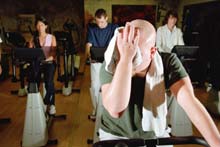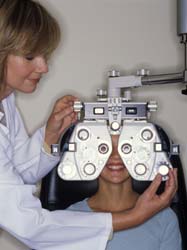|
|

|

7 Do’s Vs. Don’ts in a Down Economy
by www.SixWise.com
Economists have pronounced the Great Recession over, but at home many Americans are still struggling to make ends meet. The percent of disposable personal income going to savings is hovering around just 3 percent, according to the Bureau of Economic Analysis, which suggests Americans are still cash-crunched.
Further, 43 percent of Americans have less than $10,000 stowed away for retirement, while 27 percent have less than $1,000, the Employee Benefit Research Institute's annual Retirement Confidence Survey found. Coupled with high unemployment rates of 9.5 percent as of April 2010, these trends show that many American families are not out of the woods just yet.
So even though the economy may be making a slow comeback, it’s still important to act savvy to protect your health and your financial future. Here we’ve compiled a go-to guide to do just that -- weather out the economic storm and come out on top.
| Do |
Don't |
|

Devote a percentage of your income to healthy foods. Research has shown that more than 50 percent of Americans increase their food intake when feeling stressed out, including due to financial stress. In the past people would lose weight when faced with stressful situations, but the stress of the economy and fear of the unknown are causing people to put on weight.
By focusing your diet on wholesome foods and staying active, you’ll be able to avoid weight gain, and its related health problems.
|

Buy cheap fast-food to save money. Tightening your budget during economic uncertainty means that more people are watching how much they are spending on groceries. Oftentimes this means opting to buy cheaper, unhealthy foods to save a dollar. Fast-food giant McDonalds has reaped great benefits with their dollar menu offerings while sit down restaurants that offer healthier options are taking the backseat.
In order to protect your health down the road, and save money on future medical bills, you should focus on purchasing healthy foods for your family, and eating most of your meals at home.
|
|

Talk to your doctor about your prescriptions. Are any unnecessary? Are you being overmedicated? Could you replace any of your medications with healthy lifestyle habits? Many doctors prescribe medications when they’re not truly necessary, such as antibiotics to fight a viral infection. This exposes you to unnecessary side effects and, in the case of antibiotics, is supporting the creation of MRSA and other antibiotic-resistant superbugs. By only taking prescription medications when absolutely necessary, you’ll protect your health and save money in the process.
|

Stop taking medications without talking to your doctor first. At the height of the recession many Americans stopped taking their prescription drugs because they couldn’t afford them. But certain medications cannot be stopped cold turkey, and doing so could put your health at risk. So before you decide to stop taking a drug, make sure it’s safe to do so. At the very least, generic versions may be available to save you money.
|
|

Keep regular exercise a priority. Exercise can help prevent heart disease, stroke, diabetes and cancer, along with boosting your immune system, lowering your blood pressure and promoting healthy blood sugar levels.
If the economy has got you down, you may be tempted to park it on the couch instead of heading for a brisk walk after work, but remember that exercising increases the levels of endorphins in your body, which reduces stress and puts you in a better mood.
|

Spend a fortune to get in shape. Fancy exercise equipment and expensive gym memberships are not necessary to get the benefits of exercising. With a pair of running shoes and the will to do it, you can walk or jog your way to better health in no time.
There are also inexpensive exercise DVDs you can do right in your own home. Our favorite by far here at SixWise is the mind-body fitness program SheaNetics from MySheaNetics.com.
SheaNetics is a unique fitness and self-help philosophy dedicated to providing you with life-improving ideas and the inspirational motivation needed to achieve complete well-being. You can find out more and view an introductory video at MySheanetics.com.
If necessary, you can invest a bit of money into a few sessions with a personal trainer. He or she should be able to give you tips for working out using everyday items you have around your home.
|
|

Keep seeing your doctor for regular health screenings. Regular check-ups and health screenings can catch a problem early on, often making it easier to treat and recover from. In your quest to cut back on your budget, don’t skimp on regular preventive medical care.
|

Let your doctor talk you into unnecessary diagnostic procedures. If your doctor recommends a diagnostic test, make sure you understand what it’s for, whether it’s necessary or just a precaution, and what the consequences of declining it are. Some doctors are overly careful in their diagnostic testing out of fear of lawsuits, while other tests can turn up false positives. Do your homework to find out which tests are necessary and beneficial, and which are not.
|
|

Indulge in a vacation. A vacation is often just the thing to keep your stress levels under control. By getting away, even for just a long weekend, it gives your mind and body time to recharge, regroup and recover from the daily grind. It shouldn’t be considered optional to take a vacation, it should be regarded as a necessity in today’s harried world.
|

Blow your budget to go somewhere exotic. With travel levels down, deals abound for cheap travel around the U.S. Even some of the nicest hotels are struggling to fill up rooms, and you can stay at a four-star hotel for a fraction of the cost. There are also great bargains for cruises and all-inclusive vacations to be had right now, so if you can find one, take advantage of it.
You may also want to plan a “staycation” this year. A vacation does not have to mean jetting off to an exotic locale. You can get many of the same stress relief and relaxation, perhaps even more, by getting away for just one day or a long weekend, as long as it’s to someplace truly peaceful, such as a forest preserve, beach, your potting shed in the backyard -- even plopped in the tub listening to the Pure Relaxation CD: Guided Meditations for Body, Mind & Spirit.
|
|

Make a plan to get out of debt. But, before you devise a plan, you need to know how much debt you’re carrying, and at what interest rates. So make a list of what you owe and tally up your total debt.
Next, read this step-by-step guide on how to dig yourself out of debt. Basically, you should pay your necessities (mortgage, food, utilities) first, then move on to taxes and student loans. From there focus on paying down one credit card at a time, and start with the one with the highest interest rate.
Do whatever it takes to make sure you’re paying more than the minimum on your credit cards, as paying only the minimum, it can take 10 years or more to pay off a card. You can consider downsizing your home, cutting back on unnecessary splurges or even taking a second job.
|

Stress over your financial situation. Once you’ve made a debt repayment plan and adhere to a sound budget, put your finances out of your mind. Stressing will do nothing to help you get back on track faster, and will only cause you more headaches.
|
|

Have adequate tools for stress relief. Stress is a normal part of life, but taking time to relax and de-stress is essential. For tips on how to do just that, read It's Time to Relax: 15 Quick Tips to Help You Shift Your Gears to Relax Mode Quickly.
|

Worry yourself sick. Financial problems can lead to depression and are the number one problem for married couples, plus a major cause of divorce. Facing economical difficulties can shake up your need for security and even leave you scared about how you will survive.
But the chronic stress this worry causes is known to actually intensify inflammation, according to the American Psychological Association (APA), which makes you more vulnerable to inflammatory and neurodegenerative diseases like multiple sclerosis.
Stress can even trigger diabetes and lead to weight gain, so make sure you keep your stress levels under control.
|

SixWise Says ...
America is a country where ~ half the money is spent buying unhealthy processed food, and the other half is spent trying to lose weight.
“It’s a recession when your neighbor loses his job; it’s a depression when you lose yours.” -- Harry Truman
Money is better than poverty, if only for financial reasons.
A bank is a place that will lend you money, if you can prove that you don't need it.
Recommended Reading
Recession Bargains: What 15 Items Should You Buy Now to Take Advantage of Falling Prices?
The Six Most Recession-Proof Businesses
Sources
iVillage.com
CNNMoney.com March 9, 2010
Bureau of Economic Analysis
Gogle.com Public Data, Unemployment Rate
To get more information about this and other highly important topics, sign up for your free subscription to our weekly SixWise.com "Be Safe, Live Long & Prosper" e-newsletter.
With every issue of the free SixWise.com newsletter, you’ll get access to the insights, products, services, and more that can truly improve your well-being, peace of mind, and therefore your life!
|
|
|
|